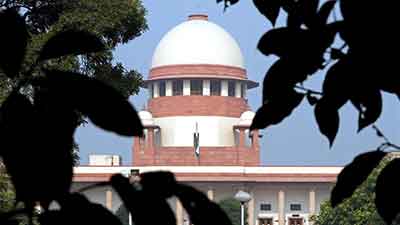Date: 08/02/2023
Relevance: GS-2: Government policies and interventions for development in various sectors and issues arising out of their design and implementation.
Key Phrases: Helang-Marwari bypass, Char Dham project, Central Empowered Committee (CEC), T.N. Godavarman (1995), Centre for Environmental Law (1995) Case, Violation of Separation of Powers
Context:
- The Indian government has decided to suspend work on the Helang-Marwari bypass, which is part of the Char Dham project in the wake of the crisis in Joshimath.
- Work on this project received the Supreme Court’s approval last year and its suspension now raises questions about the validity of the apex court’s decision.
- This is not the only instance of a project receiving a green signal from the apex court. In the last few decades, dams, mines, highways, and many other projects have commenced construction after obtaining approval from the Supreme Court.
Court As The Executive Authority Of Environmental Decisions:
- A unique feature of India’s environmental governance system is the need for the Supreme Court’s approval for administrative decisions in matters concerning the environment.
- This process came about as a result of the court’s direction in the T.N. Godavarman (1995) and the Centre for Environmental Law (1995) cases.
Violation of separation of powers enshrined in the Constitution:
- Any proposal involving tree-cutting or non-forest use in a national park
or sanctuary needs to be approved by the Standing Committee of the National
Board for Wildlife, headed by the Union environment minister but the
minister’s decision is not final:
- The proposal needs to be further examined by a special Supreme Court committee called the Central Empowered Committee (CEC), headed by a retired Secretary to the Government of India, and comprising retired Forest Service officers.
- If the CEC believes the Standing Committee’s decision to be incorrect, it can defer to the Supreme Court for the final say, along with its own opinion. This procedure prima facie contravenes the separation of powers enshrined in the Constitution.
Various Instances of the Supreme Court’s approval in matters concerning the environment:
- The practice of seeking the Supreme Court’s approval even in the absence of specific orders manifested in proceedings in 2022 as well.
- In December, a bench approved tree-felling on 0.82 hectares of forest land in Thanjavur district to widen a road and felling of 940 trees in Salem district to upgrade a road.
- Similarly, in November, the court allowed diamond mining in Panna, Madhya Pradesh, on an application moved by the mining company.
- It is highly illogical that the top court’s approval has to be sought to cut trees in less than a hectare of forest land, outside national parks and sanctuaries, or to upgrade a road when no such direction of the Supreme Court exists.
- It bears repeating that these decisions are not the outcomes of any adjudication involving opposing parties or a PIL filed by concerned individuals.
- Instead, they are a case of user agencies, mining and power companies, and the government is approaching the court directly seeking approval by filing applications – sometimes even before statutory authorities have examined a project.
Concerns associated with the supreme court's adjudication on environmental decisions:
- Lack of requisite skill and expertise:
- Unlike a specialised expert tribunal, Constitutional courts don’t possess the necessary skill and expertise to examine the technical and scientific correctness of any project.
- Judges are trained to examine and adjudicate on the legality and propriety of the decision-making process.
- As the U.S. Supreme Court observed in Daubert v. Merrell Dow Pharmaceuticals Inc. (1993), “there are important differences between the quest for truth in the courtroom and the quest for truth in the laboratory. Scientific conclusions are subject to perpetual revision. Law, on the other hand, must resolve disputes finally and quickly.”
- No critical assessment of the project:
- The judicial orders merely state that a project is allowed subject to certain standard conditions.
- There is almost no critical assessment of the project itself. Nonetheless, the court’s approval becomes a free hand for the executive to proceed with work irrespective of its social and ecological consequences.
- Fundamental Rights of citizens:
- The Supreme Court of India has original, appellate and advisory jurisdiction.
- Administrative decisions are subject to judicial review before the High Courts and the Supreme Court which has been held as a fundamental right but once the Supreme Court becomes the first and/or final approving authority in a de facto regulatory regime, the opportunity for any concerned citizen to raise the issue before the High Courts, the tribunals and even the Supreme Court becomes extinguished
- In other words, the fundamental right of citizens to question a government’s decision by way of judicial review, under Articles 32 and 226 of the Constitution, is taken away.
Conclusion:
- Separation of powers, judicial review, and equality before the law are basic features of the constitution and are essential elements of the rule of law ( I.R. Coelho v. State of Tamil Nadu, 2007).
- It is often said that the Supreme Court is not always right but it is always final. So the final authority to adjudicate disputes can’t become the first authority to approve projects.
- This needs immediate correction, ideally by the judiciary itself.
Source: The Hindu
Mains Question:
Q. It is often said that the Supreme Court is not always right but it is always final. So the final authority to adjudicate on environmental decisions can’t become the first authority to approve projects. Critically Examine.(250 words).






















